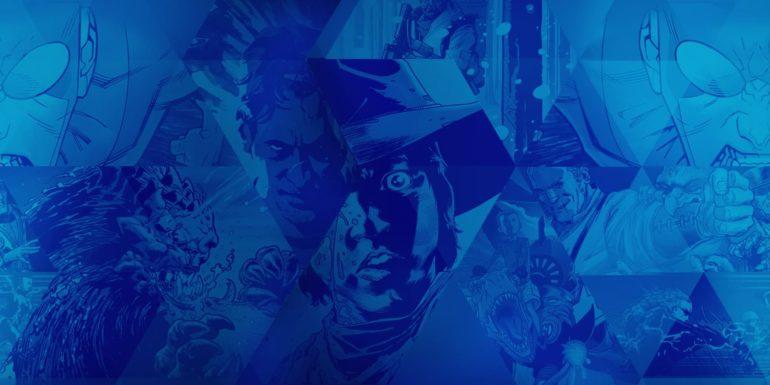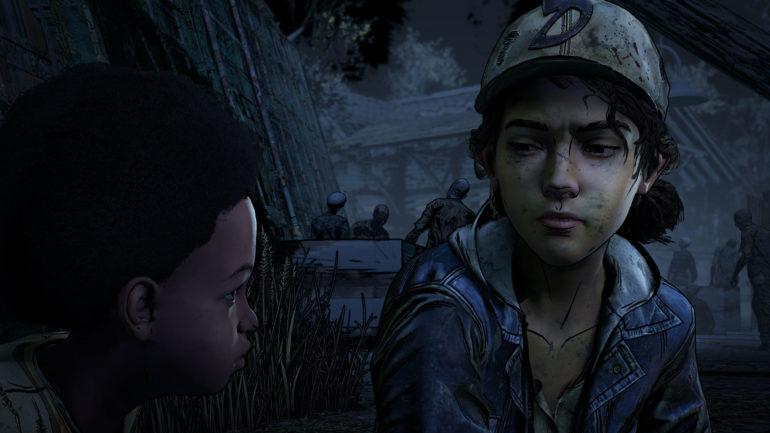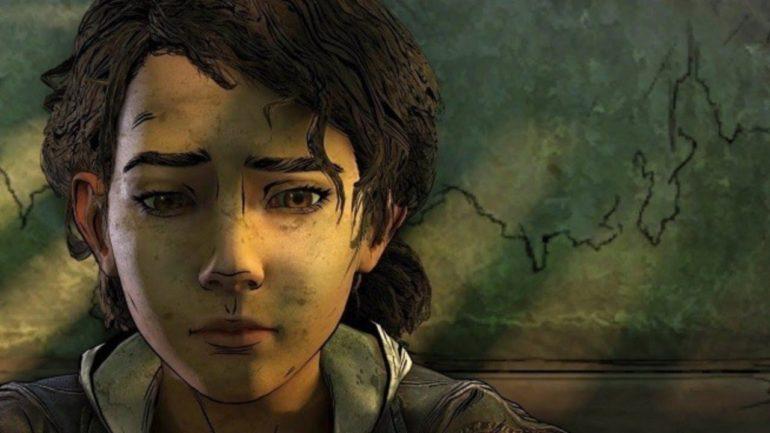‘The Walking Dead’: How Clementine’s Story Found Its End Amid the Ruins of Telltale
By Brian Crecente
LOS ANGELES (Variety.com) – When it landed last month, “The Walking Dead: The Final Season” was both the conclusion of a critically acclaimed, narratively driven video game series and the finale for a young heroine that players watched grew up across seven years of games.
It also marked the surprising, devastating conclusion to the studio of creators behind the games, and ultimately underlined their willingness to do just about anything to deliver that final moment of Clementine’s journey.
“It wraps up both basically Telltale and it wraps up the series, ‘,’ the thing that made Telltale famous,” Kent Mudle, creative director of “,” told
Variety
in a recent interview. “I worked on the very first season of ‘The Walking Dead’ so basically ‘The Walking Dead’ was Telltale to me.”
“I worked on a bunch of other titles, but that’s the game that everyone knows Telltale for, that’s what it is. We were always going to come back to doing another one — for it felt like, forever — for the eight years or so I was there.”
The Collapse
Telltale Games
was so sure of its finale take for “
The Walking Dead
” and the conclusion of protagonist Clementine’s tale that it took the unusual step of announcing all of the release dates for the episodic game’s final arc well before the games were done.
Speaking with
Variety
in September, Telltale designer Mark Darin and Mudle both talked enthusiastically about the game and how it managed to both embrace the character and tone of “The Walking Dead” comic book while also breaking free of the powerful gravity of its storytelling to forge its own tales and beloved characters.
The work on “The Walking Dead” at didn’t just help to create a beloved, interactive take on the comic book; it essentially reinvigorated a long-dormant type of narratively driven game. Combined, “The Walking Dead’s” three major seasons of video games and two spinoffs resulted in more than 50 million episodes sold worldwide.
Skybound’s Howe hopped on a flight and flew to San Rafael to hold an emergency town hall meeting
Two days after that interview with
Variety
,
with just two of the planned four episodes of the game published, Telltale Games’ suddenly laid off nearly all of its 274 employees with no notice, no severance, and barely a week’s worth of health care, just a day after two potential investors walked away from funding talks.
Both AMC and Smilegate were in discussions to invest in Telltale Games , a deal that management had been working on to essentially save the company, sources told
Variety
at the time. Lionsgate had also recently notified the board that it had decided to stop funding Telltale so it could refocus on its core business. And Lionsgate was cited, one employee said, during the meeting Friday morning as one of several things that led to the decision to lay off the company’s staff.
As the company quickly fell apart, a former employee filed a lawsuit on behalf of all of those let go, saying that Telltale Games violated state and federal labor laws with the mass layoff because it didn’t give proper notice.
Weeks later, Skybound Games, the gaming arm of Robert Kirkman’s Skybound Entertainment production company, announced it was taking over production of the last two episodes to ensure that the series’ finale would be published.
It was a Hail Mary both for a small group of the soon-to-be-unemployed developers at Telltale and , which wasn’t really designed to develop games internally.
Enter Skybound
“There was five of us,” Ian Howe, CEO of Skybound Games, told
Variety
in a recent interview. “To have a team of five people suddenly have this fall in our lap as a major project that needed completing and with a sizable development team, that was a big, big undertaking for us.
“We decided that we wanted to be completely transparent with the team.”
So Howe hopped on a flight and flew to San Rafael, Calif., where Telltale was based, to hold a sort of town hall meeting with the 50 or so developers who had been working on “The Walking Dead: The Final Season.”
“We were basically saying, ‘Here’s what we’re trying to do.’ It was before we’d resolved all the legal issues.”
Howe said he walked the group through what it was that Skybound was attempting to do and that he wanted to be completely transparent about the fact that there was no promise of a job waiting for them after the game wrapped.
“We went up and said, ‘We would like you guys to come back and finish the game. We don’t feel anybody else can do it. We don’t feel anybody else should do it. We really only want you guys to do it, but we don’t know how long this is going to take and we don’t know what the long term looks like.’”
Their response, Howe said, was life-affirming.
“What came back from that was just this intense passion to finish the game, to do almost whatever it took,” he said. “Rather than take advantage of that, we said, ‘Okay, we’re going to embrace that spirit and we’re going to help these guys finish this story with almost whatever it takes from our side.
“So there was a major financial undertaking, a major structural undertaking and then a major responsibility to the people.”
Howe and his team of four set to work finding financing for the project and figuring out how quickly they could put people back to work.
“One of the things we did was negotiating with the original landlord for some space,” he said, adding that they made sure the team was okay with working in the building where they once had jobs. “We were conscious that that could have been not something you want to put people through. It’s a traumatic thing to lose a job and we didn’t want to necessarily put people back through that.
“I literally can’t speak highly enough of what these guys did. There was never anyone who complained or ask for something, ask for anything to be honest with you, but just came back and got on with it and finished the game.”
Howe said a number of the people who stayed on to finish the game made personal sacrifices to do so and that his team tried to help out.
“What we did at the outset is we were super conscious about that team having kind of been left in a situation with no severance,” Howe said. “So we immediately put some fairly major programs in place that really would reward the team in the event that we could have a successful conclusion to the project.
“We treated that as our absolute priority. The people came first. We were very straightforward with people. We would tell them exactly what we could do and then see if that made sense for them. Some people said, ‘I can’t do that, I need longer-term security’ and that, I appreciate and understand. “
Exit Telltale
Mudle had worked at “Telltale Games” for about eight years when the end of the studio came. He said he worked primarily in cinematic roles, creating cinematics and cutscenes for years before getting the chance to be a creative director for the final season of “The Walking Dead.”
“I was just running the team there before Telltale exploded,” he said. “Then when it came back up (through Skybound) I was still doing the same thing.”
He said the downtime — the two months between the closing of Telltale Games and when Skybound swooped in to take over publishing — was the worst part of the experience for him.
“We basically went right back to work in the same building, almost in the same place with the same machines set up,” he said. “We stayed in the same building. We had to move up to a different floor, but we were still in the cavernous ruins of Telltale. We were able to continue our work pretty much exactly as it was. (Skybound) had done such good work setting everything up that we were able to sit down on the first day and get to the data on our computers and it was like no time had passed.”
Telltale’s closure came about halfway through the third episode, so the team — made up entirely of people who worked on the game at Telltale — were tasked with wrapping up the last two episodes of the fourth season.
“It was really magical. In some ways it was weird,” Mudle said of working at Skybound. “There was kind of an arc of history at Telltale where there had been a lot of overbearing executive oversight kind of throughout the history and it had sort of lessened with time as everything had gone down. It was even lighter on the final season — even when Telltale was active — and now with the benefit of Skybound Games, it was like ‘Oh, it’s just us. We make the calls on if the game is going to be good. As long as Skybound also thinks it’s good then we’re fine. So in a way, it was almost kind of liberating.”
Mudle added that it was an emotional task for the team, creating the conclusion to both “The Walking Dead” and, essentially, the studio.
“Even before the studio was closing it felt like both an honor and a huge task to actually be the people to put an end to Clementine’s story,” he said. “We know so many people care about her. There are so few characters that people are so passionate about. They act like she’s their daughter. We just really wanted to make sure that it closed out her story in a way that was satisfying but also closed out Telltale.
“It’s kind of a tribute to Telltale in a lot of ways. There’s especially stuff in the final episode, like there’s a hallway with credits all over and stuff and things like that and callbacks to earlier seasons’ stuff just to hopefully make it feel like it really is a cohesive end to the whole journey that we all took together.”
And there were quite a number of challenges beyond those that typically come with game development.
Chief among them was the fact that Skybound wasn’t offering long-term employment. Howe said they had a number of conversations with people who told them they wanted to finish their work on the game, but that they received a job offer and were going to take it.
“every part of this has been actually really life-affirming”
“We basically did whatever we possibly could to accommodate those people,” Howe said. “We even had people working remotely or working at night while doing another job. And we always made sure the new employer was aware of what they were doing. Honestly, every part of this has been actually really life-affirming because everybody I think came at it and tried to do the right thing.”
Mudle also called Skybound’s approach very transparent from the beginning.
“Everyone knew when their end date contract was and there were incentives in place to continue to that end date,” he said. “Some people stayed all the way to the end and some people found other more stable opportunities for longer-term and left before the project was over.”
Skybound Game Development
“What we set out to do was to rescue the game and that was the number one objective and we were kind of really laser-focused on that,” Howe said.
While Howe said Skybound was completely transparent with the Telltale team about the future — they didn’t, for instance, say they would have a job at Skybound following their work on “The Walking Dead” — they couldn’t tell them what the future held for the group.
“The reason we didn’t know was because Skybound Games was in its absolute infancy when this all happened,” he said.
Skybound Games was formed as a publishing division of just five months before Telltale’s implosion. The group was set up to seek out interesting indie titles and, at least initially, help publish them.
“The model that Skybound Games was generally operating on was working and collaborating with external development teams,” Howe said. “We didn’t have — we don’t have a vision for a large internal development team.”
The group was looking at what parts of the development production they might eventually bring in-house, but in general, the plan was for Skybound to work with external “full-service” development teams to collaborate on new projects, be they entirely new IP or ones based on the vast library of property Skybound owns.
“So [it was] much more in the vein of a traditional publisher,” he said. “But obviously this coming along was really about dropping almost everything else and focusing in on it.”
With the game shipped, the Skybound Games team is mostly refocusing on its founding principals and goals.
The year includes a pretty packed roster for Skybound, with games like battle royale title “notmycar” coming to Steam in early April. The group is also publishing a physical edition of “Gang Beasts” and bringing “Skullgirls” to Nintendo Switch. They’re also working with Beamdog to bring back a slew of classic role-playing games like “Icewind Dale,” “Planescape Torment,” and “Neverwinter Nights.”
“What we’re doing at the moment is we’re trying to provide help and support to independent developers who have got upcoming launches or have already had success in the digital realm and we’re helping with physical distribution,” Howe said. “We’ve built that capability so we can now distribute to all the major markets in the world ourselves. That’s something that most developers are never going to build, would never want to build and never should build. So we set that up pretty quickly as we wanted to make sure we can help.”
Next year includes a lot of projects the team has lined up but hasn’t yet announced, Howe said. He did say the company plans to lean more heavily toward publishing original titles based on new IP or Skybound IP.
“That will be our lifeblood kind of from 2020 and beyond,” he said.
Telltale Survival
Now that “The Walking Dead: The Final Season” has shipped, a small core of the team — about 15 people — is all that remains working at Skybound, focused on some backend code and looking into bringing the game to other platforms.
“What the long term holds, we’re actually in the midst of that conversation at the moment about what that might look like,” Howe said of the remaining team members. “But no decision has been made yet.”
Howe said they’re discussing with Mudle and the rest of the group whether there’s a way for the team to stay on at Skybound or whether they should spin up a new studio that Skybound would possibly publish for.
“All of those things are up for discussion, but what really is the most important thing is to find a project that we’re all really excited about,” he said. “That probably overrides everything. I think if we can figure that part out we’ll make the rest work somehow.”
Mudle said he and the rest of the group have some “hopes and ideas,” but nothing that’s real.
“The people I made the final season with are some of the best people I have ever worked with,” Mudle said. “If I can continue to find any excuse to work with them ever again in the future I will absolutely do so.”
Does that mean that Skybound could back another Telltale-esque game, maybe even one based on “The Walking Dead”?
“Are we going to tell more stories with ‘The Walking Dead?’ 100%. Yes,” Howe said. “That’s what we do. Every day there’s a discussion about that, multiple discussions about that at some level. But at the moment there’s nothing concrete that’s actually happening.
“I’d be equally happy for Ken, for example, to tell me the game he’s always wanted to make or the story he’s always wanted to tell as much as telling a story around one of our IPs. It’s much more of an organic process. I think that that openness leads to more creativity, which I think leads to better content ultimately.”
The End
“The Walking Dead: The Final Season” wrapped up late last month, hitting Windows PC, PlayStation 4, Nintendo Switch, and Xbox One. It seemed mostly well received by fans and critics alike, though didn’t hit the same high scores as that first season.
Howe said he was very happy with how it ended.
“I think it’s incredibly emotional, and it ticked all the boxes for me in many ways because it wasn’t a story that needed to have this enormous finale,” Howe said. “I think they nailed it.”
Mudle, too, was happy with the ending.
“I think it had everything that’s come before and was respectful to the incredibly long and hard journey that Clementine has been on,” he said. “I think ending it the way we did and providing a bit of hope in the sort of bleak and often ruthless world of ‘The Walking Dead’ is the right way to close this out.”
Did Clementine’s story end in a way that could leave the door open for a sequel?
“I have ideas of what I would do,” Mudle said, when asked, “but I don’t know if that would happen.”




